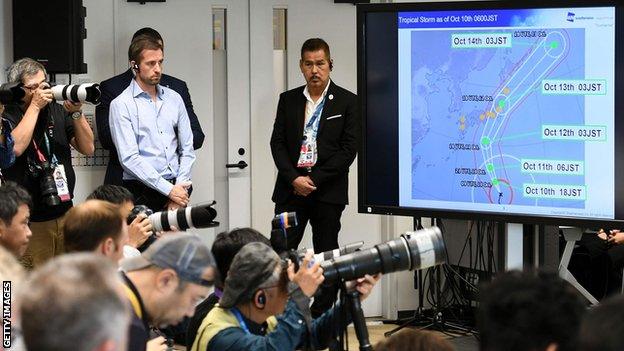Rugby World Cup: Typhoon Hagibis met with 'woeful intransigence' in Japan
- Published

World Rugby held a press conference to discuss the impact of Typhoon Hagibis on Thursday
Scotland exited the World Cup four years ago in large part because of a refereeing blunder. The country is now in danger of being dumped from this World Cup on the back of a typhoon and a technicality. The typhoon is unavoidable, the technicality is not. Here in Hamamatsu, there is concern and anger within the Scottish ranks over the way this story is developing.
Typhoon Hagibis is coming and if the meteorologists are correct then it's going to be severe, more damaging than previous incarnations that caused considerable destruction. It's not a typhoon, it's a super typhoon. The advice to all in Yokohama, where Scotland are supposed to be playing Japan on Sunday in a game of games, is stay indoors and batten down the hatches. This is going to be a rough ride.
It needs to be said that in the grand scheme of things, rugby is unimportant. The great hope in all of this is that when the skies clear the damage is limited and lives are spared. The storm will do its worst on Saturday and two games have already been called off because of it - England v France and New Zealand v Italy have both gone.
Unbelievably, after a decade of planning and reassuring all visitors that they had robust measures in place to deal with any fixture chaos caused by bad weather, World Rugby says it had no way of getting those games played, no viable contingency plan to delay or move the games. Its solution was not surgery but a straight amputation.
Some competing nations have been gobsmacked by the lack of compromise and the sudden disappearance of the typhoon battle plan World Rugby stressed was very firmly in place. There's been a lack of information. Some teams in the eye of the storm have reported that they have bent over backwards to try to get detail from the tournament organisers and it's been a struggle.
'World Cup's integrity will be trashed'
It's left a bad taste. Italy needed to do a job on the All Blacks to make it through to the quarter-finals but they were denied the opportunity. Their great leader, Sergio Parisse, remarked that if the shoe was on the other foot and it was New Zealand who needed the points to ensure their passage to the knock-outs, the game would not have been cancelled. It's hard to argue with his assessment. New Zealand now get a nice long break before their quarter-final. Players carrying knocks will have more time to recover. They've done quite nicely out of this.
Parisse's comments about New Zealand could also be applied to England and France. Had either of them needed a win to go through, would that game have been sacrificed or would World Rugby have found another way?
The feeling among those close to the Italy and Scotland camps is that there are contingency plans in place for some countries, but not for others. As a relative small fry in the world game Italy are dispensable. As one of the countries that voted against World Rugby's Nations League idea, thereby dashing the hopes and incurring the wrath of the southern hemisphere nations, Scotland are not exactly over-burdened with influential friends.
Ten years in the planning and all that World Rugby has come up with in the hardly revelatory occurrence of a typhoon in typhoon season is match abandonments. Two already, but if that becomes three on Sunday then the entire integrity of the World Cup as a tournament and World Rugby as an organisation will be trashed.
'Lack of flexibility spectacularly self-defeating'
Scotland are building momentum and would face Japan on Sunday in good order. There's a new Scotland team forming and it seems to have a bit of attitude. At their best, they're a real danger to the Japan fairytale. A postponement would suit the hosts. They'd go straight to the quarter-finals as group winners and a probable date with South Africa. How box-office is that? It's a dream ticket for the organisers.
Sunday's forecast promises sunshine and bright blue skies in Yokohama. The question is what state will Yokohama be in at that point? We are now in a situation where we only find out on Sunday morning if the game will go ahead. Confusion reigns and nobody rules. World Rugby's bizarre intransigence in refusing to move games and instead unilaterally cancelling them has been woeful.
The logical thing to do would be move Scotland v Japan to Monday, but for now World Rugby is saying nothing. It believes that it will go ahead. Let's hope they're right. If they're wrong, then there's no Plan B, no other way. It's Yokohama or bust. The spectre is this: if health and safety experts turn up at the stadium on Sunday and don't particularly like the look of things then Scotland are out of the World Cup in the most farcical circumstance imaginable.
Given that this match is of such consequence in the pool and given that upwards of 60 million people in Japan alone will be watching - it will be one of the most, if not the most watched Test match in rugby history - the lack of flexibility from World Rugby is astonishing, grossly unfair and spectacularly self-defeating.
'There's gathering apoplexy here'
This championship has thrown up some terrific stuff on the field but all the on-pitch drama combined might struggle to live with what was going on behind closed doors on a day of the most surreal intrigue.
At a midday news conference in Tokyo on Thursday, World Rugby's tournament director Alan Gilpin announced the cancellation of England v France and New Zealand v Italy. He described the impact of the approaching Typhoon Hagibis as an "exceptional, complex and rapidly evolving situation".
'The thought of sleeping in a train station is not a good one'
Gilpin was asked about the Scotland v Japan game and said he hoped it would go ahead. If it couldn't, what was the contingency? There didn't appear to be one. World Rugby, he said, had looked "extensively" at other possible arrangements but has had to rule them out. Moving the game to another city? Delaying the game by a day, from Sunday to Monday? "Unfeasible on logistical and safety grounds," said Gilpin.
There is a gathering apoplexy here. Yes, it states in the tournament rules that if a pool game has to be cancelled then it cannot be rearranged for a different day. A different stadium, yes. A different day, no. Scottish Rugby don't believe that's hard and fast. In the participation agreement given to each country, it says there is a clause that effectively amounts to force majeure and that clause does allow some wiggle room in terms of pushing a game back a day.
It would be a surprise if Scottish Rugby wasn't in touch with its lawyers right now. It would be a surprise, too, if those lawyers weren't creating an almighty case against World Rugby abandoning all contingency plans and opting for the nuclear option of cancelling the game, declaring it a 0-0 draw and sending Scotland home.
Scotland's position is very clear on this. They're flexible. They'll play it on Sunday as planned in Yokohama or anywhere else of World Rugby's choosing. They'll play it on Monday if required. They'll play it with a crowd or behind closed doors, no matter. The tournament organisers says no to all alternative arrangements.
Amid all the uncertainty, Gregor Townsend spoke mid-afternoon in Hamamatsu. He said that as far as he's concerned the game is going ahead and he has to believe that it is. He's got a team to prepare and he can't allow vagueness to enter their thinking. He's planning on a Sunday game. Rugby hell will break loose if he doesn't get it.
